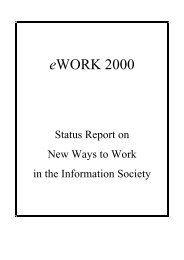Proceedings of 8th European Assembly on telework (Telework2001)
Proceedings of 8th European Assembly on telework (Telework2001)
Proceedings of 8th European Assembly on telework (Telework2001)
Create successful ePaper yourself
Turn your PDF publications into a flip-book with our unique Google optimized e-Paper software.
204Even though these and many <str<strong>on</strong>g>of</str<strong>on</strong>g> the other ‘old’ problems <str<strong>on</strong>g>of</str<strong>on</strong>g> Taylorism may still be a relevantobject <str<strong>on</strong>g>of</str<strong>on</strong>g> development interventi<strong>on</strong> in many workplaces, in the envir<strong>on</strong>ment <str<strong>on</strong>g>of</str<strong>on</strong>g> the knowledgebasedec<strong>on</strong>omy the starting points for workplace development programmes have become morecomplex, giving rise to new challenges <strong>on</strong> several levels:• The real actors in the knowledge-based ec<strong>on</strong>omy are increasingly networks <str<strong>on</strong>g>of</str<strong>on</strong>g> organizati<strong>on</strong>s.The focus <str<strong>on</strong>g>of</str<strong>on</strong>g> development interventi<strong>on</strong> should shift, accordingly, from the level <str<strong>on</strong>g>of</str<strong>on</strong>g> individualworkstati<strong>on</strong>s or working units to cover organizati<strong>on</strong>-, company- and network-level issues as well.• Due to this change <str<strong>on</strong>g>of</str<strong>on</strong>g> c<strong>on</strong>text and focus, problems and development needs facing workplaceshave changed in the sense that it is increasingly difficult to find ready-made expert soluti<strong>on</strong>s tothem, or even standards or ‘best practices’.• The effects <str<strong>on</strong>g>of</str<strong>on</strong>g> development interventi<strong>on</strong> can reach further than ever in a networked envir<strong>on</strong>ment,something which makes it harder to foretell the indirect impact <str<strong>on</strong>g>of</str<strong>on</strong>g> soluti<strong>on</strong>s <strong>on</strong> the various partiesinvolved, or even to assess them afterwards; generally speaking, it is becoming more difficult topredict the potential <str<strong>on</strong>g>of</str<strong>on</strong>g> development processes at the outset <str<strong>on</strong>g>of</str<strong>on</strong>g> projects, because the soluti<strong>on</strong>s tendto emerge during the process itself. In short, soluti<strong>on</strong>s are becoming increasingly unpredictable andunc<strong>on</strong>trollable.• The role <str<strong>on</strong>g>of</str<strong>on</strong>g> employee participati<strong>on</strong> is under increasing pressure from at least two points <str<strong>on</strong>g>of</str<strong>on</strong>g>view: firstly, the role <str<strong>on</strong>g>of</str<strong>on</strong>g> representative participati<strong>on</strong> and the scope for acting as a ‘collectivevoice’ for employees in processes <str<strong>on</strong>g>of</str<strong>on</strong>g> change is becoming problematic. Networked organizati<strong>on</strong>alstructures do not automatically have the arenas for employee participati<strong>on</strong> which are required bylaw or collective agreements. Even at best, it may be very difficult to determine who is eligibleto legitimately represent some<strong>on</strong>e else’s interests. It is also likely that employee interests willbecome increasingly divergent as their labour market positi<strong>on</strong>s become more differentiated. Itmight ultimately be downright misleading to speak <str<strong>on</strong>g>of</str<strong>on</strong>g> a ‘collective voice’ <str<strong>on</strong>g>of</str<strong>on</strong>g> the employees in anetwork. Sec<strong>on</strong>dly, the new emphasis <strong>on</strong> tacit knowledge as a source <str<strong>on</strong>g>of</str<strong>on</strong>g> competitive strength forcompanies, and therefore a determining factor <str<strong>on</strong>g>of</str<strong>on</strong>g> the labour market positi<strong>on</strong> <str<strong>on</strong>g>of</str<strong>on</strong>g> employees as well,means that the opportunity to participate directly in the planning and implementati<strong>on</strong> <str<strong>on</strong>g>of</str<strong>on</strong>g> changewill become increasingly crucial from the employees’ own point <str<strong>on</strong>g>of</str<strong>on</strong>g> view. Tacit knowledge isaccumulated <strong>on</strong>ly through doing and using, and through social interacti<strong>on</strong>, with shared experiencesat the core.The Need for New ApproachesThe above challenges call for the development <str<strong>on</strong>g>of</str<strong>on</strong>g> overall progamme and project design c<strong>on</strong>cepts,and the way programmes and projects are actually managed and implemented:• Development strategies: Workplace development in a networked and increasingly dynamicenvir<strong>on</strong>ment demands new programme strategies. As problems and development needs facingworkplaces are becoming increasingly complex and requirements for c<strong>on</strong>tinuous learning aregrowing, building forums for boosting exchange <str<strong>on</strong>g>of</str<strong>on</strong>g> informati<strong>on</strong> and experiences betweenworkplaces and other actors is <str<strong>on</strong>g>of</str<strong>on</strong>g> crucial importance. Acquiring the sufficient expertise tosuccessfully deal with these ever more complex issues in programmes calls for combinati<strong>on</strong> <str<strong>on</strong>g>of</str<strong>on</strong>g>








